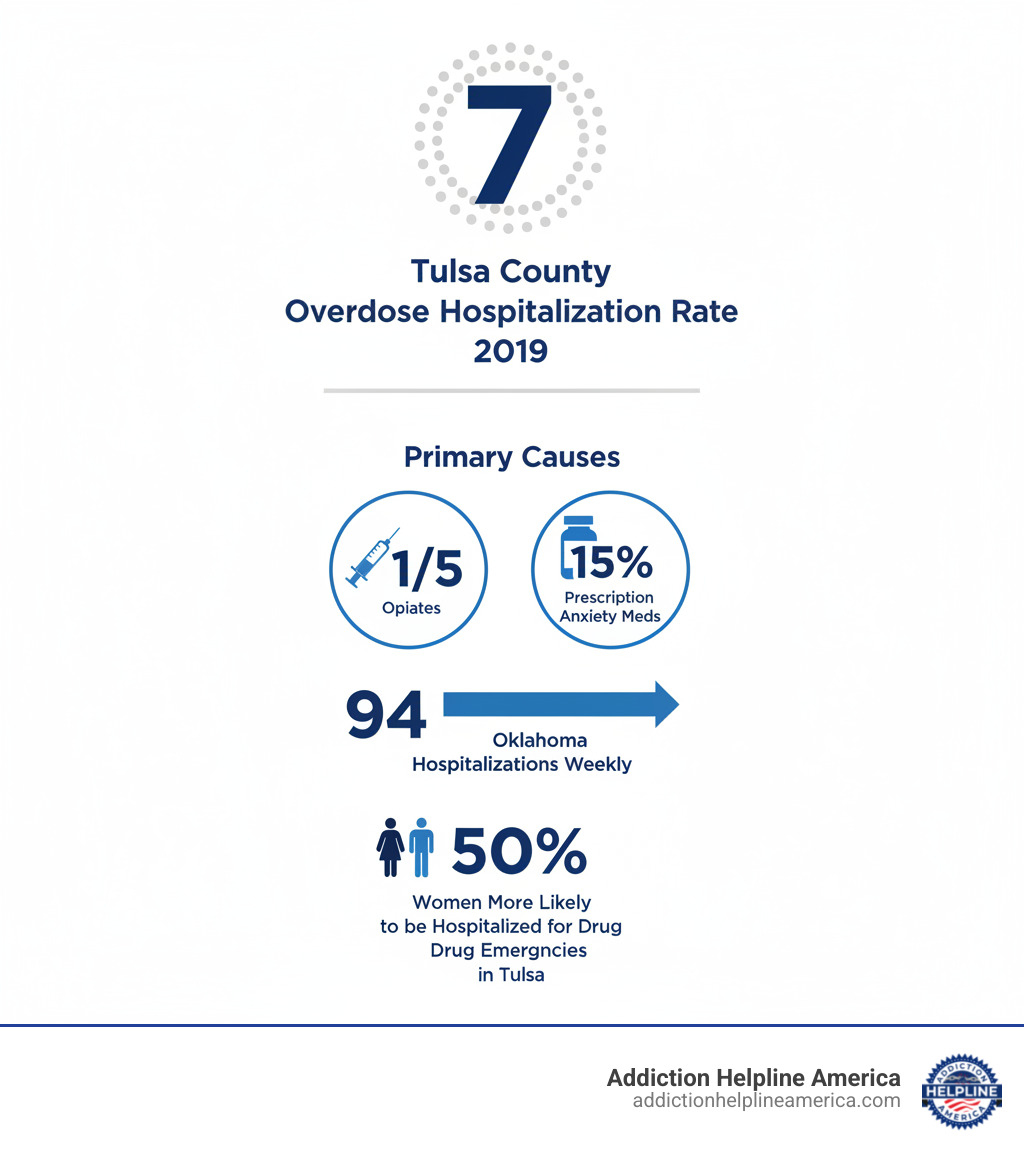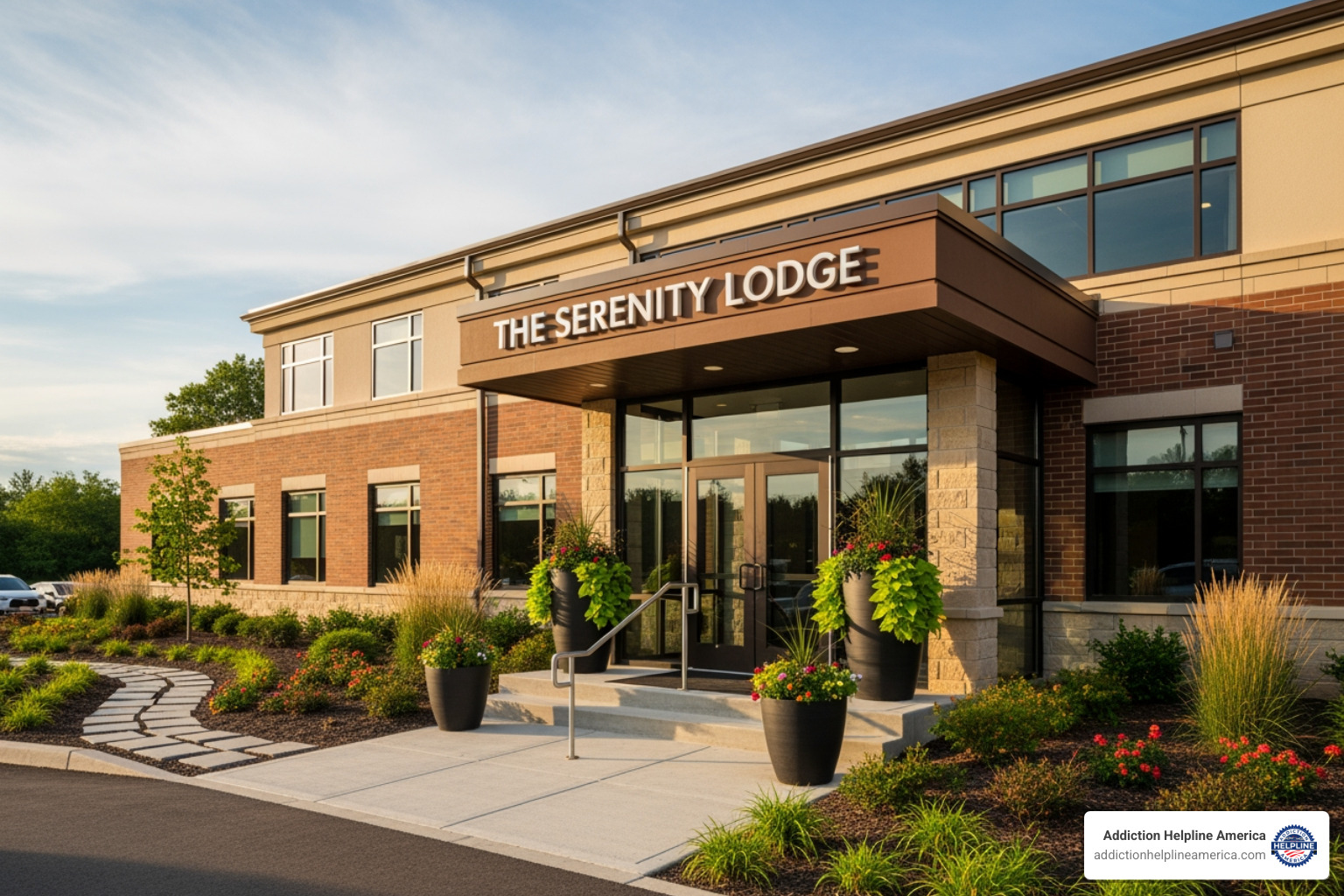
Why Finding the Right Tulsa Rehab Facility Matters
Tulsa rehab facilities offer life-saving care for those struggling with addiction. However, with over 37 treatment centers in the area, finding the right one can feel overwhelming during a crisis.
Quick Overview of Tulsa Rehab Options:
- 37+ addiction treatment centers near downtown Tulsa.
- Levels of Care: Medical detox, inpatient, PHP, IOP, outpatient, and sober living.
- Payment Options: Many facilities accept Medicaid, private insurance, TRICARE, and self-pay.
- Specialized Programs: Options include gender-specific, dual diagnosis, MAT, veterans, and faith-based care.
- Average Cost: $52,085 in Tulsa, which is lower than state and national averages.
The need for these services is urgent. Tulsa County has one of the highest overdose hospitalization rates in the country, with opiates and prescription anxiety medications being major contributors. Every week, 94 Oklahomans are hospitalized for drug abuse, and women in Tulsa are 50% more likely to face drug-related emergencies.
Despite these statistics, recovery is absolutely possible. The right treatment center can make all the difference. This guide examines seven prominent Tulsa rehab facilities, comparing their services, costs, and programs to help you find the best fit.
At Addiction Helpline America, we provide confidential, 24/7 support to connect individuals with Tulsa rehab facilities that match their unique needs. We believe the best facility is one that addresses your specific challenges, accepts your insurance, and provides a safe, supportive environment for healing.
Understanding the Landscape of Addiction Treatment in Tulsa
Tulsa rehab facilities offer a spectrum of care designed to meet people at any stage of their recovery journey. Understanding these levels helps you find the right fit.
- Detoxification: The first step for many, providing safe, medically supervised withdrawal from substances like alcohol, opioids, or benzodiazepines. 24/7 monitoring manages symptoms and ensures safety.
- Inpatient Residential Treatment: An immersive, live-in environment away from daily triggers, offering around-the-clock support to focus entirely on recovery. For more details, explore inpatient rehabilitation services in the area.
- Partial Hospitalization Programs (PHP): A step-down from inpatient care, providing intensive treatment for several hours a day while allowing you to return home or to a sober living environment at night.
- Intensive Outpatient Programs (IOP): A flexible option with 9-12 hours of treatment per week, allowing you to maintain work, school, or family commitments while receiving comprehensive support.
- Standard Outpatient Treatment: The least intensive option, typically involving weekly therapy and support groups. It’s ideal for step-down care or for those with less severe substance use issues.
- Aftercare and Sober Living: Ongoing support programs that are crucial for long-term sobriety. Sober living homes offer a substance-free environment to practice new skills while transitioning back to independent life.
Addiction rarely exists in a vacuum. Co-occurring disorders, or dual diagnosis, involve struggling with both addiction and mental health conditions like depression, anxiety, or PTSD. The best Tulsa rehab facilities provide integrated treatment, addressing both issues simultaneously for a greater chance at lasting recovery. Family involvement is also key, and many facilities offer family therapy and education to heal relationships and build a supportive home environment.
Types of Therapies Available
Tulsa rehab facilities use evidence-based therapies to provide practical tools for staying sober.
- Cognitive Behavioral Therapy (CBT): Helps identify and change negative thought patterns and behaviors that lead to substance use.
- Dialectical Behavior Therapy (DBT): Teaches skills like mindfulness, distress tolerance, and emotional regulation, particularly for those with intense emotions or co-occurring disorders.
- Medication-Assisted Treatment (MAT): Combines FDA-approved medications like buprenorphine and Suboxone with counseling. It is a highly effective, evidence-based approach for opioid and alcohol use disorders that reduces cravings and withdrawal symptoms.
- Holistic Approaches: Therapies like yoga and meditation treat the whole person by reducing stress and improving self-awareness.
- Family Therapy: Involves loved ones in the healing process to repair relationships and improve communication.
- Group Counseling: Provides a supportive environment where individuals can share experiences and learn from peers who understand their struggles.
Specialized Programs for Diverse Needs
Recovery paths are unique, so many Tulsa rehab facilities offer specialized programs.
- Women’s Rehab: Addresses unique challenges like trauma, parenting concerns, and societal pressures in a safe, gender-specific environment. Given that Tulsa women are 50% more likely to be hospitalized for drug emergencies, these programs are vital.
- Men’s Rehab: Creates a space where men can open up about societal pressures and emotional expression.
- Programs for Veterans: Understands the challenges of military service, such as PTSD and trauma. Some facilities accept TRICARE military insurance.
- Treatment for Young Adults: Addresses the specific needs of 18-25-year-olds, including peer pressure, identity formation, and career goals.
- LGBTQ+ Friendly Programs: Provides an affirming, judgment-free environment for healing from stressors related to identity and discrimination.
- Faith-Based Recovery: Integrates spiritual principles into treatment for those who find strength in their religious beliefs.
A Closer Look at 7 Prominent Tulsa Rehab Facilities
Choosing the right treatment center is a critical step. To help, we’ve examined seven well-established Tulsa rehab facilities, each with unique strengths. These centers range from outpatient clinics to comprehensive residential programs, serving a diverse population with various payment options.
Here’s a quick comparison:
| Facility Name | Levels of Care Offered | Key Specializations | Primary Payment Options |
|---|---|---|---|
| Valley Hope of Tulsa | IOP, Outpatient, Telehealth, Continuing Care | Flexible scheduling, Family care, Evidence-based therapies | Private Insurance |
| Great Plains Recovery | Medical Detox, Residential, PHP | Holistic approach, Serene environment, Family therapy | Most Major Insurances |
| Laureate Psychiatric Clinic and Hospital | Inpatient, Residential, PHP, IOP, Outpatient | Dual Diagnosis, Eating Disorders, Adults & Adolescents | Private Insurance, Self-Pay |
| Resonance Center for Women | IOP, Outpatient | Women-only, Court-ordered treatment, Trauma-informed | Medicaid, Private Insurance, Self-Pay |
| GRAND Addiction Recovery Center | Medical Detox, Residential, Outpatient | Co-occurring disorders, Comprehensive recovery | Private Insurance, Medicaid, Self-Pay |
| Palmer Continuum of Care | Residential, Outpatient, Family Services | Non-profit, Women and Children’s Center, Youth services | Medicaid, Self-Pay, Grants |
| Tulsa Comprehensive Treatment Center | Outpatient | Opioid Addiction, MAT (Methadone, Buprenorphine) | Medicaid, Private Insurance, Self-Pay |
Valley Hope of Tulsa
Valley Hope of Tulsa specializes in flexible outpatient services for those who need to balance treatment with work or family. They offer Intensive Outpatient Programs (IOP), standard outpatient care, and telehealth options. A key strength is their integration of family care into the recovery process, helping to heal relationships and build a strong support system. Their approach is grounded in evidence-based therapies that provide practical tools for sobriety. As one alumna shared, “Valley Hope saved my life. They know what they are doing, and they really care.” Learn more at Drug & Alcohol Rehab Center in Tulsa – Valley Hope.
Great Plains Recovery
Great Plains Recovery offers a serene, residential setting for those who need to step away from daily triggers. Their services begin with medical detox to ensure safe, comfortable withdrawal under 24/7 supervision. Following detox, their residential program and Partial Hospitalization Program (PHP) provide structured, therapeutic environments. Great Plains takes a holistic approach, treating the whole person and incorporating family therapy to restore relationships. They accept most major insurance plans.
Laureate Psychiatric Clinic and Hospital
For individuals with co-occurring addiction and mental health challenges, Laureate Psychiatric Clinic and Hospital offers specialized dual diagnosis treatment. As a hospital-based facility, Laureate provides a full spectrum of care, from inpatient crisis stabilization to outpatient support. This ensures consistent care as patients progress. They have particular expertise in eating disorder treatment and serve both adults and adolescents with age-appropriate care. Find more information at Laureate Psychiatric Clinic and Hospital Tulsa OK.
Resonance Center for Women
Resonance Center for Women provides gender-specific treatment that addresses the unique challenges women face in recovery, such as trauma and parenting responsibilities. They have expertise in court-ordered treatment and use a trauma-informed care model. Their program combines intensive outpatient services with life skills training to help women rebuild their lives. In a county where women are 50% more likely to be hospitalized for drug emergencies, this women-only space fosters deep, focused healing.
GRAND Addiction Recovery Center (formerly 12&12)
With a long-standing community presence, GRAND Addiction Recovery Center (formerly 12&12) offers a full continuum of care, including medical detox, residential treatment, and outpatient programs. Their primary strength is treating co-occurring disorders, addressing addiction and underlying mental health conditions like depression or PTSD simultaneously. This comprehensive approach aims to build a stable, fulfilling future. GRAND accepts private insurance, Medicaid, and self-pay options.
Palmer Continuum of Care
As a non-profit organization, Palmer Continuum of Care is mission-driven to break the cycle of addiction in families. Their standout feature is the Women and Children’s Center, which allows mothers to receive treatment while keeping their children with them, removing a major barrier to care. Palmer serves adults, youth, and families with residential and outpatient options, focusing on healing the entire family system. They accept Medicaid and offer grants and self-pay options to ensure care is accessible.
Tulsa Comprehensive Treatment Center
Tulsa Comprehensive Treatment Center specializes in treating opioid addiction through Medication-Assisted Treatment (MAT). This outpatient clinic combines FDA-approved medications like methadone and buprenorphine with counseling. MAT is a proven, evidence-based method that stabilizes brain chemistry, reduces cravings, and lowers overdose risk, allowing individuals to focus on the psychological aspects of recovery. This specialized care is life-saving for those struggling with heroin, fentanyl, or prescription painkillers. They accept Medicaid, private insurance, and self-pay.
Navigating Costs, Insurance, and Legal Rights
Concerns about cost should not prevent you from seeking help. The average cost of addiction treatment in Tulsa is approximately $52,085, which is lower than both the Oklahoma and national averages. More importantly, costs vary widely, and insurance makes recovery affordable for most people. Thanks to federal law, most health plans must cover substance use disorder treatment.
Tulsa rehab facilities offer a range of payment options to fit different financial situations.
Paying for Treatment at Tulsa Rehab Facilities
- Private Health Insurance: Accepted at 13 facilities in the Tulsa area. Always verify if a facility is in-network with your plan to minimize out-of-pocket costs. Confirm your deductible, co-pays, and coverage limits beforehand.
- Medicaid (SoonerCare): A vital option for those with limited income, accepted at 19 rehab programs in the Tulsa area.
- Medicare: Covers addiction treatment for individuals 65 and older or those with certain disabilities.
- TRICARE: Accepted at 6 facilities, providing coverage for military families and veterans.
- Self-Pay/Cash: An option at 14 facilities, often with payment plans available to spread out the cost.
- Sliding Scale Fees & Financial Aid: Many non-profit centers adjust costs based on income. Don’t hesitate to ask about scholarships or grants.
- IHS/Tribal/ITU Funding: 5 facilities in the area are funded to provide services at little or no cost to eligible Native Americans.
Legal Protections for Oklahomans Seeking Treatment
Oklahoma law provides important safeguards for those seeking treatment.
- Mental Health Parity Laws: Ensure insurance companies cover addiction treatment equally to physical health care, without imposing stricter limits or higher co-pays.
- Good Samaritan Overdose Prevention Law: Protects individuals who call 911 during an overdose from arrest or prosecution for drug possession. If you witness an overdose, call for help immediately.
- Americans with Disabilities Act (ADA): Protects you from being fired for seeking rehab, as long as you can perform your job. Employers may be required to provide reasonable accommodations.
- HIPAA Confidentiality: Your treatment is private. Facilities cannot share your health information with anyone—including employers or family—without your written consent.
Frequently Asked Questions about Addiction Treatment in Tulsa
Considering treatment brings up many questions. Here are answers to some of the most common concerns people have when looking at Tulsa rehab facilities.
How long does rehab in Tulsa typically last?
The length of treatment depends on your individual needs. There is no one-size-fits-all timeline.
- Short-term programs typically last 30 days or less, focusing on stabilization and initial therapy.
- Long-term programs of 60 to 90 days or more are often recommended. Research shows this extended time allows for deeper work on root causes and building coping skills.
- Outpatient programs can continue for several months or even a year, providing ongoing support as you transition back to daily life.
The most effective approach often involves a full continuum of care, stepping down from more intensive programs (like detox or residential) to less intensive ones (like outpatient and aftercare) over time.
How do I get a loved one into rehab if they refuse?
This is a painful and frustrating situation. While you cannot force an adult into treatment without a court order, there are steps you can take.
- Use Compassion: Approach them with love and concern, not judgment. Express how their addiction is affecting you and others.
- Hire a Professional Interventionist: A trained professional can guide a structured conversation to help your loved one see the need for treatment.
- Set Healthy Boundaries: Stop enabling behaviors, such as giving money or making excuses. This is not about punishment, but about protecting yourself and allowing them to feel the natural consequences of their actions.
- Be Prepared: Research Tulsa rehab facilities in advance. When they are ready for help, you can act immediately.
Addiction Helpline America is available 24/7 to help you steer these difficult conversations.
What should I look for when choosing among Tulsa rehab facilities?
Selecting the right facility is a crucial decision. Here are key factors to consider:
- Accreditation: Look for accreditation from The Joint Commission or CARF, which indicates high standards of care and safety.
- Licensed Staff: Ensure the team includes medical doctors, licensed therapists (LPC, LCSW), and nurses specializing in addiction.
- Evidence-Based Practices: The facility should use proven therapies like CBT, DBT, and MAT.
- Individualized Treatment Plans: Avoid cookie-cutter programs. Treatment should be custom to your unique history and needs.
- Dual Diagnosis Care: If you struggle with mental health issues like depression or anxiety, choose a facility that offers integrated treatment for co-occurring disorders.
- Aftercare Planning: A good program prepares you for long-term success with a clear plan for ongoing support, therapy, and alumni programs.
- Payment and Insurance: Confirm that the facility accepts your insurance or offers payment options that work for you.
Conclusion: Finding Your Path to Recovery in Tulsa
Navigating the path to recovery can feel daunting, but you’ve taken an important first step by exploring your options. Tulsa offers a diverse landscape of treatment, from flexible outpatient services to comprehensive residential care.
You’ve learned about specialized programs for women, veterans, and those with co-occurring disorders. You’ve seen how facilities like Valley Hope, Great Plains Recovery, Laureate, and others offer unique approaches to healing. The cost of treatment in Tulsa is lower than state and national averages, and with numerous insurance and payment options, quality care is within reach.
The “best” Tulsa rehab facility is the one that feels right for you—the one that understands your struggles, accepts your insurance, and provides a safe environment for healing. Recovery is a journey, not a destination, and it starts with finding the right support.
At Addiction Helpline America, we offer free, confidential guidance 24/7. We’re not here to push you toward one facility; we’re here to help you find the program that matches your unique situation and gives you the best chance at lasting recovery.
Your journey to a healthier life can start now. We’re here to help you take that first step.
Our helpline is 100%
free & confidential
If you or someone you care about is struggling with drug or alcohol addiction, we can help you explore your recovery options. Don’t face this challenge alone—seek support from us.
Programs
Resources
Will my insurance
cover addiction
treatment?
We're ready to help
Find the best
drug or alcohol treatment
center
Are you or a loved one struggling with addiction? Call today to speak to a treatment expert.
















